- Research
- Research Centers
- Journals
- Admission
- Introduction
- Programs
- Application
- Alumni & Giving
- Alumni Club
- Giving
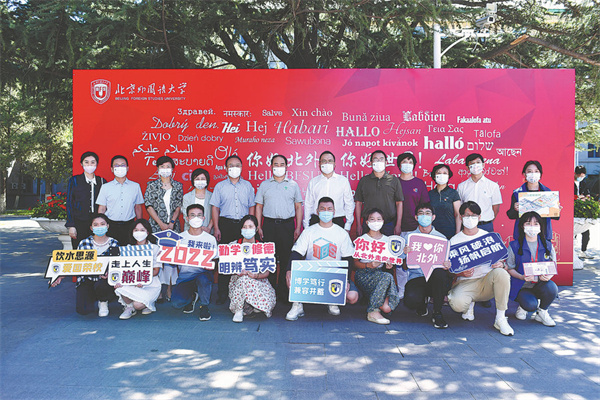
A ceremony is held to welcome new students at Beijing Foreign Studies University in early September. Wang Dinghua (back row, sixth from left), Party secretary of the university, and Yang Dan (back row, seventh from left), president of the university, attend the event. [Photo provided to China Daily]
Beijing Foreign Studies University grooms students as skilled communicators to forge stronger ties between China and the world, An Baijie reports.
As a saying goes, to learn a language is to have one more window to look at the world. Jin Xiaoyan, a teacher at Beijing Foreign Studies University, couldn't agree more. For 13 years, she has been helping students develop and hone a global vision using the powerful tool of language.
The director of a freshman class of 23 at the faculty of French and Francophone studies, Jin often uses audiovisual aid to drive home the point.
She plays a video from 1964 of the school's seniors being interviewed by the French media, on the eve of the establishment of diplomatic ties between China and France, to convey how language can bridge the gap between two very different cultures.
Jin stresses how communication is the key to enhancing China's access to the world and vice versa. In the video, French language students in the school express their wish to serve the country by becoming interpreters and teachers. Jin uses the recorded interview to instill confidence in her students, who are fresh out of middle school, so that the baton of faith to foster global friendships can be passed down.
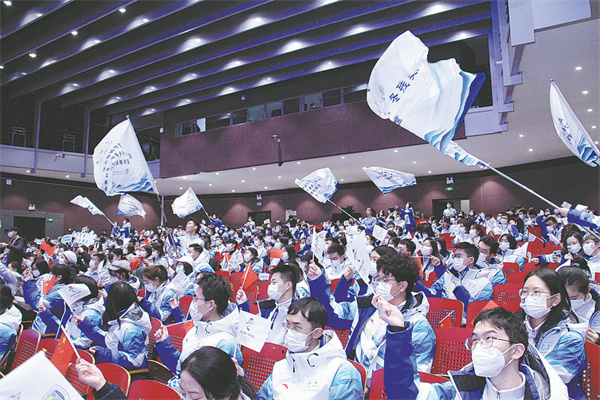
Students take part in a ceremony on Jan 18 before setting out to work as volunteers for the 2022 Olympic and Paralympic Winter Games in Beijing. [Photo provided to China Daily]
Call of duty
Wang Dinghua, the university's Party secretary, says the school aims to nurture the potential of its students and boost the country's ties with the world.
In an interaction with faculty members ahead of Teachers' Day earlier this month, Wang reminded them of President Xi Jinping's message last year on how to promote mutual understanding between nations.
Right before the university celebrated its 80th anniversary on Sept 25, 2021, Xi replied to a letter by the school's senior professors, hoping that the university will cultivate more interdisciplinary patriotic talents with global vision and professional skills.
In the letter, Xi emphasized that foreign language universities have the strength to boost China's bond with other countries and urged BFSU to explore talent on the campus to achieve the said goal.
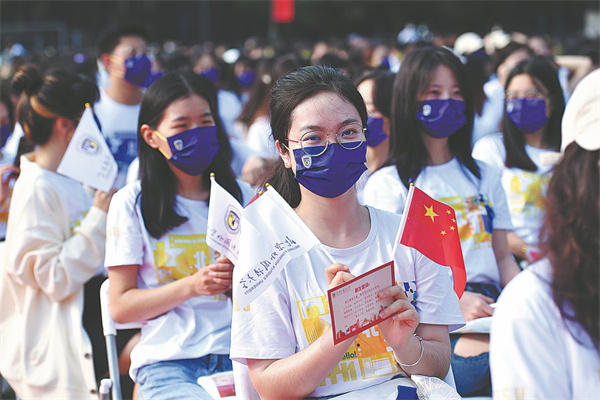
Students celebrate the beginning of a new semester. [Photo provided to China Daily]
As the first foreign language university founded by the Communist Party of China, Wang says, the school has served the country's development strategy in a proactive manner since its founding eight decades ago. He says it is following the school anthem, "Wherever the people need us, we will go", in letter and spirit.
The university has implemented an effective strategy to improve China's communication in major and minor languages. Courses cover 101 foreign languages, and the school has consolidated its position as a leader in the teaching of minor languages.
Under a project chaired by Wang, university researchers recently finished editing and publishing 20 books on education and culture in the countries involved in the Belt and Road Initiative. The books are more than a window to these nations. They act as reference materials for China's education reforms and development policies.
The books will be gifted to the 20th National Congress of the CPC next month.
Established in 1941, when the Chinese were fighting against Japanese invaders, BFSU was originally called the Russian Language Team in the Third Branch of the Chinese People's Anti-Japanese Military and Political College. It was renamed Beijing Foreign Languages Institute in 1954 and took its current name in 1994.
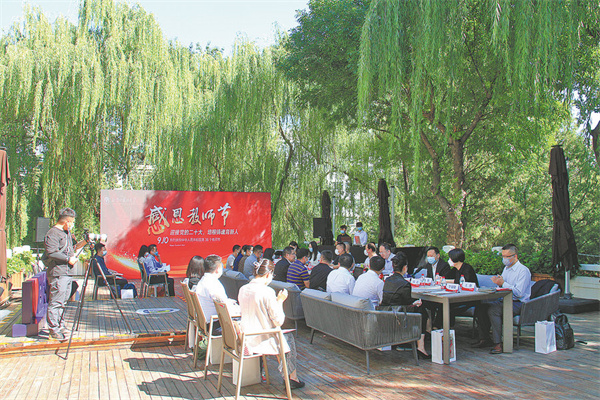
A symposium is held to mark Teachers' Day. [Photo provided to China Daily]
Well known as one of the "cradles of diplomats", the university functions directly under the Ministry of Education and it is now listed under the national "double first-class" initiative.
Since the launch of reform and opening-up of China, it has been exploring ways to comprehensively expand its global vision.
At the 2022 Winter Olympic and Paralympic Games in Beijing, BFSU gave full play to the professional advantages of disciplines and sent out more than 900 teachers and students for volunteer service and the operation of a multilingual call center for the Games, using multiple languages, multiple channels and forms to tell the world the story of the Winter Olympics in Beijing.
Currently, it caters to undergraduate, postgraduate and doctoral students, promotes mutual recognition of Chinese and foreign credits, and offers dual-degree programs. It has established strong cooperation with top foreign academic institutions and encourages students to participate in international teaching programs and internships with international organizations for hands-on experience.
Yang Dan, president of the university, says BFSU is pursuing the goal of "becoming an international, distinctive, high-level and comprehensive foreign language university" during the 14th Five-Year Plan period (2021-25), and has adopted the strategies of "strengthening the university with talents, developing the university academically, and establishing the university globally".
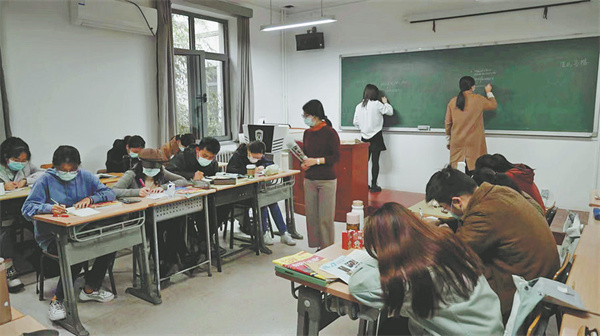
Jin Xiaoyan instructs students in her class. [Photo provided to China Daily]
Linguistic resources
In his address at the welcome ceremony for new students on Sept 3, Yang, who is also deputy Party secretary of the university, called on the 3,008 freshmen to inherit "the fine traditions" forged by their predecessors and promote the building of a barrier-free, egalitarian world, where communication in different languages is embraced.
According to Yang, BFSU students must be able to see the world from diverse perspectives, discover and present a real, multidimensional and all-round image of China, leverage their linguistic advantages to introduce "the profoundness, vividness and prospects of the biggest country", and demonstrate China's confidence in facing global challenges. He urged the students to become "linguistic resources for the building of a community with a shared future".
The BFSU freshmen comprises both Chinese students and those from overseas. Hryshayeva Katsiaryna, a doctoral student from the School of Chinese Language and Literature, Belarus, says she's here to forge a stronger bond between the two nations and their peoples.
Jin says she's proud to be a mentor at BFSU. She adds that she feels rewarded when her students finally clear academic hurdles and use their knowledge to make the world a better place.